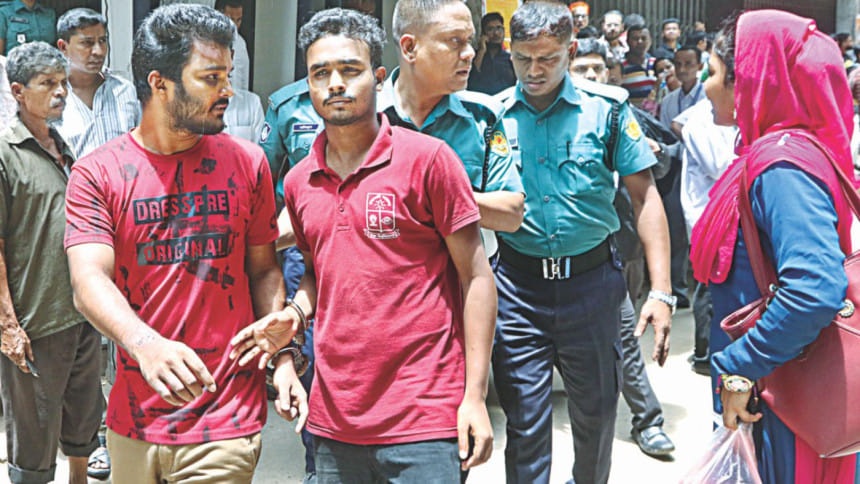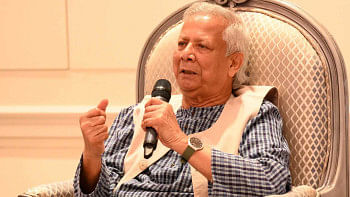Hear no evil, see no evil, speak no evil… but do some good, at least!

The police handling of the entire anti-quota episode so far reminds me of the pictorial idiom that one finds displayed in many public places in China and Japan, in particular in the form of three primates popularly known as the thinking sages or the wise apes, each covering three of the five main sensory organs. And I had often wondered what that meant. The three figures, by their postures must surely be conveying some deep-rooted wisdom which only the wise and the insightful can fathom. But I could not muster enough courage, during my three-year stint in China, lest be thought of as a fool, to ask my Chinese friends the message the three were trying to convey. In doing so I proved right a Confucius saying that the man who asks a question is a fool for a minute, the man who does not ask is a fool for life. I have been ignorant about this till I saw police in action, particularly against the recent quota reform protesters.
One of the meanings imputed to the idiom is being a good boy, distancing oneself from evil thoughts, evil words and evil action, while another is not to shy away from acting against the bad, evil and the corrupt. But little did I realise, till recently, how literally the second explanation of the axiom has been made an article of faith by an agency in this country whose bounden obligation it is to see that evil, in every form or shape, is purged from the society.
That is why the police fail to see a quota reform protagonist being beaten mercilessly with a hammer by one member of the pro government student cadre, while several others were beating him with wooden implements on the streets of Rajshahi, or grossly distorting the actual narrative of the picture to make it a "mere scuffle" between "some members of the public" and a "so-called student" when that "so-called student" victim happens to be a Masters student in RU. And those "members of the public", about ten of them, have been identified by our reporter as leaders and activists of the of the pro government student wing. Perhaps the local police can take some lessons from the reporter as to how to identify offenders and lawbreakers, and unlearn the lessons of how not to identify reprobates, particularly those linked to power. It is regrettable that the distinction between the administration and the ruling party has been so blurred that the state agencies forget their real obligation—the safety and security of the common and ensuring their freedom to exercise their basic rights.
This despicable episode, one fears, is the agonising culmination of the anti-quota movement which was carried out without breaking any law. Given that even the prime minister had announced her intention to do away with the quota system on the floor of the Sangsad, the treatment meted out to the quota reform group is shocking. Regrettably, the victims are the ones who are being hounded out by the police and pro ruling party student organisation. And even hospitals are refusing treatment to wounded activists. At least in one case that we know of, Toriqul Islam was turned away from RMCH, according to his mother, which predictably the hospital authorities have denied. While the attackers remain invisible, only in the eyes of the police, the quota reform movement leaders are arrested and put on remand, two of them allegedly for vandalising the DU VC's residence.
Every day police actions, or better put, inaction, to deal with excesses of ruling party apparatchiks, leads me to believe that the maxim has found very dedicated takers in our law enforcing agencies. When they cannot see what only an infantile blind person will miss, or hear and speak only what their political masters would be happy with, we are in one way allowing evil to order, and be a part, of our lives.
The idiom conveys a thought that is a double-entendre, carrying more than one meaning. But by conveying the apparently very astute words, what is overlooked is that two of the three figures are either watching, hearing or seeing the proceedings around them, since they cannot cover all the three organs simultaneously. I wonder whether our law enforcers are capable of shutting everything off and see, hear or do nothing
It is not advisable always to take wise advice selectively, certainly not for the police. The police must always hear the evil, see the evil to chastise the evil. To turn a blind eye to crimes is not only turning back on the oath they take before induction in the force but also encouraging evil to perpetuate in, and, pervade our lives.
Brig Gen Shahedul Anam Khan ndc, psc (Retd) is Associate Editor, The Daily Star.





Comments